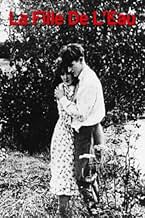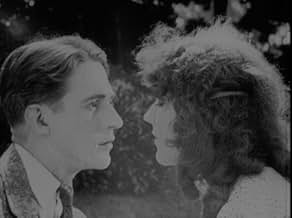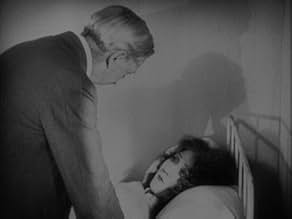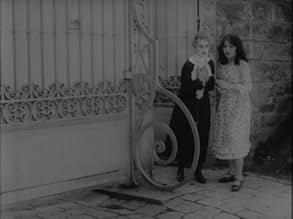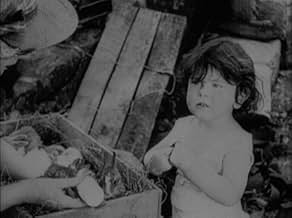Ajouter une intrigue dans votre langueAfter her father's death and her uncle having drunk all the inheritance, Virginia is left alone. She is accepted by a family of bohemians but a quarrel between the bohemians and the peasants... Tout lireAfter her father's death and her uncle having drunk all the inheritance, Virginia is left alone. She is accepted by a family of bohemians but a quarrel between the bohemians and the peasants coerce her to flee the peasants' riot. She is then helped by Raynal who falls in love wit... Tout lireAfter her father's death and her uncle having drunk all the inheritance, Virginia is left alone. She is accepted by a family of bohemians but a quarrel between the bohemians and the peasants coerce her to flee the peasants' riot. She is then helped by Raynal who falls in love with her but is too shy to tell her. Sheltered by his father, Virginia is robbed by her uncle... Tout lire
- Réalisation
- Scénario
- Casting principal
Avis à la une
But there is a dream sequence here that, as so often with these silent dreams, I urge you to see. It's about the girl transmuting in her feverish mind these barely comprehensible forces that threaten the virgin soul into images that will make sense; so an imaginative flight, a sensual, delirius game of hide-and-seek where the coarse, violent men haunt her down, where a piece of rope transforms into the snake of mischievous desire, a point-of-view rushing towards a door and the light outside, and finally the man who can protect her shown, quite literally, as a champion on his white horse galloping across the skies.
The overwhelming experience is so perfectly about the distorted imprint of the world. This should be seen next to the best moments in Epstein. There is shadow here cast by the eye in motion, emotional or otherwise.
Another note that intrigues, a blemish in the perfect picture of her well-to-do benefactor. His parents are shown at one point hastily leaving for Algiers on account of business; what was probably meant innocently at the time, now can only leave us wondering at his source of wealth.
The heroine called Gudule (the name has become completely ludicrous in today's France ;no one is called Gudule anymore)is played by Renoir's favorite actress of the silent era ,Catherine Hessling.Her fate is worthy of Hugo's "les miserables" :mistreated by a wicked lecherous uncle ,taken in by a poacher and his mum, left in the cold and the rain...And finally she finds love :a nice young man falls for her and marries her.His background is very bourgeois ,but the parents do not seem to bother.That is to say we are far from "Boudu Sauvé des Eaux" ,"La Chienne" and even "Une Partie de Campagne" .
Best moment: the heroine's nightmare;people who know well Renoir's silent era will notice the similarities between this sequence and that of "La Petite Fille aux Allumettes" where the little match girl and her attentive escort go for a horse ride in the sky.The comparison stops here for " La Fille de l'Eau' is inferior to the Andersen adaptation.
Actually the main influence is DW Griffith but then again Hessling is not
Lilian Gish.
For Renoir's fans.The others might find it a bit obsolete.
The story gives the impression of having been cut down from a sprawling melodrama and crammed into too small a space, with highly-coloured events occurring in implausible and ultimately tedious sequence: the film is only about seven reels, but felt considerably longer to sit through by the end. There is no character development to speak of, the various individuals concerned being one-dimensional cardboard figures who pop in and out of the plot as convenient, and the leading lady is neither convincing as an adolescent nor, apparently, much of an actress. The male roles are fairly well-played within the limitations and stereotyping of the script, but Catherine Hessling all too often gives the impression of simply striking poses and painting on expressions to order.
The dislocated and arbitrary nature of the calamities that befall her verges at times on the bathetic, since practically no prefiguring takes place. If a man falls overboard, or a quarry opens up suddenly underneath her, or a family abruptly up sticks and move abroad lock, stock and barrel, then it is purely for the convenience of the plot. As others have commented, the most memorable sequence is that of the nightmare where she finds herself surreally beset by villains from earlier episodes; this experimentation was presumably where the director's heart lay. A little of this, however, goes a long way.
All in all, the film isn't even bad enough to be good. An actress of Mary Pickford's calibre might perhaps have pulled some successful emotional impact out of the twopenny plot, but failing any particular interest or sympathy for the central character (it's hard not to share La Fouine's impatience as she proves such a shrinking liability in her first poaching lesson) I felt this picture had little to offer. It tries for low humour; it tries for high drama; it tries for romance. It doesn't achieve a terribly impressive level in any of them.
A melodramatic air can be noted in the film's storyline; it tells the story of Damen Gudule (characterized by the director's muse, Catherine Hessling) a girl who goes through many and varied misfortunes, the sad details of which this aristocrat will enumerate.
Gudule works with her father and uncle in a scow, up and down river (first disgrace: a girl working, and to makes matters worse, in such a vulgar place); when her father accidentally drowns, her uncle tries to abuse the poor little orphan.
Weary of this harassment, Gudule runs away and leaves the scow behind, uncle included, and joins a group of low life people (the lady reads cards and the boy is a petty thief, occupations not very commendable especially the lady's one); due to Gudule's unlimited charms she soon attracts another undesirable suitor but the petty thief rescues her honor. When the little orphan rejects the young pursuer's further indecent proposals, the rejected scoundrel, helped by some neighbors, decides to burn the wagon of her new family.
Alone, without wagon or family (they ran away during the fire), the tragic Gudule's destiny becomes bleaker still with the reappearance of her uncle, who asks her to finance his pitiful life. The hapless young woman then is instructed to rob the house where she is now working and where she has attracted the young Master (another mishap; the intimacy between different social classes)
The young Master, when he discovers that his dearly beloved has been extorted by her uncle, decides they must get rid of such an unrepresentable family member and defeats the evil uncle in a tough fight; Gudule's new heartthrob takes the young woman with all his family to Algeria (as though poor Gudule hasn't suffered enough; now she must endure the tacky holiday destination chosen by her lover)
In spite of the film's imperfections and undefined style, this German count was impressed by Gudule's dream sequence with its obvious surrealist influence, it fascinates the spectator with its strange and suggestive shots; it is mainly because of this that the film deserves to be seen.
And now, if you allow me, I must temporarily take my leave due to the fact that this Count needs to called to order too, some unrepresentable family members.
Le saviez-vous
- AnecdotesCharlotte Clasis's debut.
- ConnexionsEdited into Spisok korabley (2008)
Meilleurs choix
Détails
- Durée
- 1h 11min(71 min)
- Couleur
- Mixage
- Rapport de forme
- 1.33 : 1


